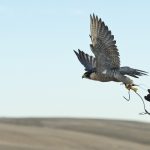The ancient sport of falconry interests many people, but the time and effort to master the skill makes it a sport for only the most dedicated. However, you can still learn more about the history of falconry and its use today. The sport helps everyone to develop an appreciation for the beauty, intelligence, and value of the falcon.
History of Falconry
Falconry is an ancient sport that became a highly prized skill in the middle ages throughout Europe and beyond. Falcons were a treasured item during medieval times and often became high-priced trades for ransoms and peace treaties. The sport was not solely an English or European one, as falconers existed in Japan, the Middle East, and elsewhere.
Recovered art pieces from as early as 722 BC reportedly show falconry taking place in Mesopotamia. The Germanic Goths become falconers sometime between the second and fourth centuries and passed those skills on to the Romans in the fifth century. Historic texts discuss falconry in Russia, the Philippines, and the Middle East.
Falconry remained popular as monarchs used the skills of the birds for both hunting and entertainment at gatherings. Using falcons made hunting easier and more productive for the residents of many communities throughout Europe. In the 1600s, a Dutch town called Valkenswaard was reliant on falconry for almost its entire economy.
Resurgence in Popularity
Falconers faded in numbers after the 17th century as the use of guns became a more common hunting method. The sport was rare in the United States but began to gain more followers after the publication of several books on the sport in the 20th century. Preservation efforts to save the endangered peregrine falcon also increased interest in falconry.
Benefits of Falconry
The potential benefits of falconry help to boost the popularity of the sport. Falconry helps to prevent the extinction of beautiful birds like the peregrine falcon by educating people on their value to the environment. The hope of many falconers as they show the birds is that people will become more committed to preservation once they see the birds in action.
Falcons and hawks serve a valuable purpose as they help to keep pest populations under control. Their ability for the falcons to hunt many types of game bird and the hawks to hunt rodents so well makes them a useful and completely natural form of pest control. Services around the country use falcons and hawks for this purpose and to keep nuisance birds away from croplands, airports, and more.
Consideration Before Beginning
Falconry offers many benefits and rewards, but it is not a sport for everyone. It takes many hours of training to learn the skills needed to communicate with falcons and hawks. The birds become a permanent responsibility for the handler and rely on them for all their care. Many laws regulate the practice, so people need to stay informed on the regulations to prevent any problems.
Expenses include a license to own a bird and another to use the falcon or hawk during hunting. Falcons need special equipment, food, and healthcare. Following the bird in flight requires tracking equipment.
Time is the biggest investment for falconers. A test determines if someone is ready to start their apprenticeship. Someone new to the sport must locate a sponsor so they can apprentice under their guidance. Training could take months or years. Time spent with a falconry club and its members can help anyone interested in falconry to see if it is the right sport for them.
Safety and performance rely on training and reliable equipment. Falconry equipment like game bags, gloves, and tracking equipment do not fill the shelves at most hunting supply shops. At Mike’s Falconry Supplies, we provide the gear when you are ready to begin. We offer educational material, safety equipment, and more. Visit our website or contact us today.

 "A USA Company
"A USA Company






